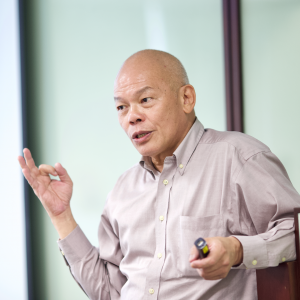Rice Culture, Social Efficiency Orientation, and Evidence for Gene x Culture Coevolution
Date:
10 MARCH 2023
Time: 10.00am to 11.00am
Speaker: Prof. Soo Hong CHEW
Venue: I³ Building, 21 Heng Mui Keng Terrace, Executive Seminar Room, Level 4
Programme
Title: Rice Culture, Social Efficiency Orientation, and Evidence for Gene x Culture Coevolution
Professor Soo Hong CHEW
( Southwestern University of Finance and Economics; National University of Singapore)
Synopsis:
This talk is based on two related papers co-authored with Richard Ebstein and Lu Yunfeng (abstracts appended). One links Telhelm et al.'s (2014) rice theory to the Hsee-Weber (1999) cushion hypothesis which suggests that people in a collectivist society have greater capacity to take on risks than members of an individualistic society because they are more likely to receive help if they are in need, and consequently less risk averse. The second paper offers evidence for gene x culture co-evolution linking rice cultivation to cooperativeness. Together, they point to a social efficiency orientation hypothesis with possible roots in gene x culture coevolution providing a shared basis for the fabled East-West difference (replicated in Rice-Wheat) in risk attitude as well as cooperativeness in the literature.
1. Rice Culture and the Cushion Hypothesis: Experimental Evidence from Incentivized Risk-Taking Tasks (2023, Economics Letters)
Abstract: Cumulative evidence points to the validity of the Hsee-Weber (1999) cushion hypothesis suggesting that people in a collectivist society, such as China, have greater capacity to take on risks than members of an individualistic society such as the United States, because they are more likely to receive help if they are in need (i.e., they could be ‘cushioned’), and consequently, less risk averse than those in an individualistic society. Rice theory (Talhelm et al., 2014) points to a parallel between East-West difference and what differentiates the rice farming South from the wheat farming North in China in the individualism-collectivism dimension. These hypotheses jointly predict that people from China's rice farming regions would be more risk tolerant than their counterparts from the wheat farming regions. Using incentivized decision-making tasks, we find support for the cushion hypothesis being applicable within China in a large sample of subjects recruited in Beijing.
2. Rice Cultivation, Cooperativeness, and Preliminary Evidence for Gene (Dopamine D4 Receptor) x Culture Coevolution
Abstract: We investigate how culture induced by rice cultivation influences people’s cooperative behavior with 1,213 Chinese university students in Beijing indexed by the proportion of rice farming in their birth province. First, we found that cooperativeness proxied by the level of contribution in an incentivized public goods game (PGG) varies positively with the proportion of rice cultivation. Second, we extended our laboratory-based results by using survey data relating to cooperativeness from the China Family Panel Studies (CFPS). Third, we showed that the dopamine receptor D4 (DRD4) exon III coding region repeat polymorphism 2R genotype is associated with increased cooperativeness in the PGG. We further observed a positive correlation between frequency of the 2R genotype and province-level history of the introduction of rice farming, leading us to speculate/suggest the notion regarding gene-culture coevolution on a time scale across 10,000 years.
About the Speaker
 Chew Soo Hong is a Emeritus Professor at the National University of Singapore (NUS) and Professor at the Southwestern University of Finance and Economics. He received his Ph.D. in interdisciplinary studies from the University of British Columbia and has previously taught at the Hong Kong University of Science and Technology (HKUST), University of California, Irvine, Johns Hopkins University and University of Arizona. He is among the pioneers in axiomatic non-expected utility models and is a fellow of the Econometric Society which awarded him the Leonard J. Savage thesis prize. He has previously directed HKUST's Center for Experimental Business Research and is co-director of NUS' Lab for Behavioral x Biological Economics and the Social Sciences which aims to bring together genomics, neuroscience, decision theory, and behavioral and experimental economics to seek a deeper understanding of decision making at the neural and molecular levels. Chew has published in well-regarded journals in economics such as Econometrica, Journal of Political Economy, Review of Economic Studies, Journal of the European Economic Association, and Journal of Economic Theory as well as more biology-oriented ones including Proceedings of the National Academy of Science, Proceedings of the Royal Society B: Biological Sciences, Neuron, and Neuroimage.
Chew Soo Hong is a Emeritus Professor at the National University of Singapore (NUS) and Professor at the Southwestern University of Finance and Economics. He received his Ph.D. in interdisciplinary studies from the University of British Columbia and has previously taught at the Hong Kong University of Science and Technology (HKUST), University of California, Irvine, Johns Hopkins University and University of Arizona. He is among the pioneers in axiomatic non-expected utility models and is a fellow of the Econometric Society which awarded him the Leonard J. Savage thesis prize. He has previously directed HKUST's Center for Experimental Business Research and is co-director of NUS' Lab for Behavioral x Biological Economics and the Social Sciences which aims to bring together genomics, neuroscience, decision theory, and behavioral and experimental economics to seek a deeper understanding of decision making at the neural and molecular levels. Chew has published in well-regarded journals in economics such as Econometrica, Journal of Political Economy, Review of Economic Studies, Journal of the European Economic Association, and Journal of Economic Theory as well as more biology-oriented ones including Proceedings of the National Academy of Science, Proceedings of the Royal Society B: Biological Sciences, Neuron, and Neuroimage.
For enquiries, please contact Shivani Nakhare at 6601 1065 or rminsr@nus.edu.sg

